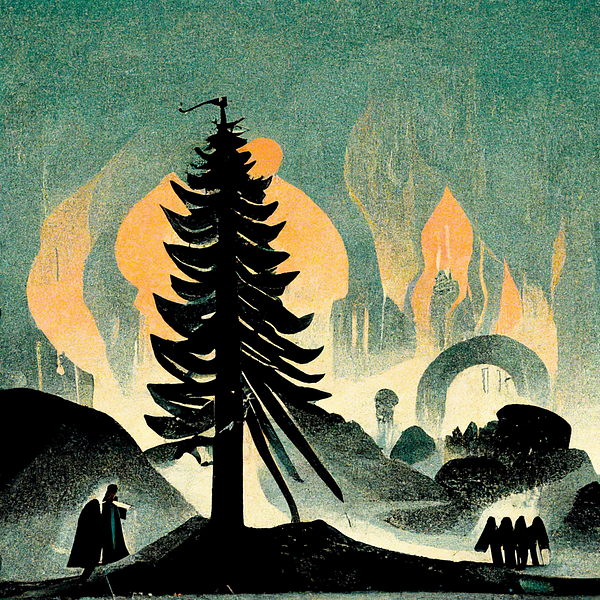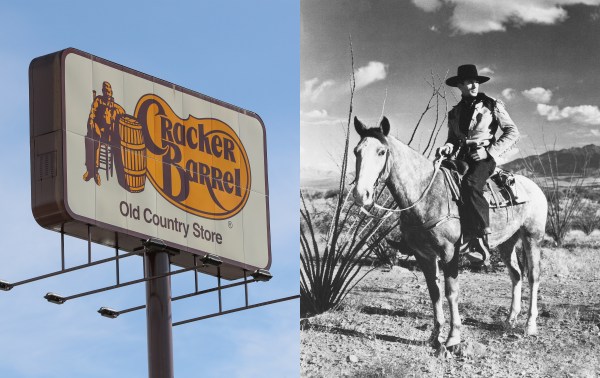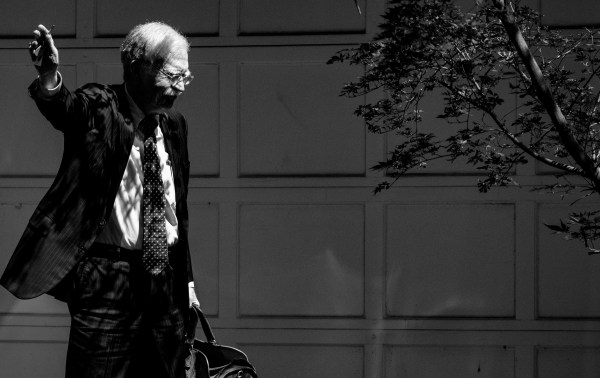“Deep indeed run the roots of Evil, and the black sap is strong in them. That tree will never be slain. Let men hew it as often as they may, it will thrust up shoots again as soon as they turn aside.”
It is with this depressing thought that Borlas begins his dialogue about the nature of evil with his interlocutor Saelon in The New Shadow, J.R.R. Tolkien’s scrapped sequel to the Lord of the Rings trilogy. The text is brief, just the beginning of a novel that was meant to show “the inevitable boredom of Men with the good.” Amazon has brought attention to what occurred before the trilogy in its new series The Rings of Power, but it is worth examining the few pages Tolkien wrote in which he explored what came next. His understanding of human nature makes what little of The New Shadow that he wrote deeply insightful, and an unsettling warning about our own political climate.
As a devout Catholic, Tolkien believed we live in a sinful, fallen world that will never be perfected by human hands. It’s a concept reflected in his works; the whole of the Middle Earth writings is a saga about the rise and fall and rise and fall and rise and fall of evil. Over and over again, Middle Earth is faced with a dark force, which Middle Eartheans band together to defeat, only to see another malevolent threat rise after. The lesson ought to be clear: At best, evil can be guarded against and squashed out when it first starts to rear its head. But the inhabitants of Middle Earth, like those of our world, tend not to go for that strategy, falling, instead, into complacency. As Tolkien noted in one of his letters, mankind has a “quick satiety with good.”
This satiety is bad enough when it leads to blindness to the rise of a new evil, but in The New Shadow, Tolkien sought to explore a more frightening outcome of it: What happens when people don’t just ignore the threat of evil, but forget why it is a threat to begin with. Set in one of the kingdoms of men, Gondor, 105 years after the Lord of the Rings trilogy, Sauron and his Orcs have been relegated to the stuff of legend while all the humans who fought them have died off. Only a few survive who have even the slightest memory of the War of the Ring from their childhood, and having known nothing but peace and prosperity for their entire lives, a restless sect of young Gondorians become fascinated by the evil figures of old. Boys run around committing acts of vandalism pretending to be Orcs, and there are whispers that a cult devoted to the old evil has begun. Our introduction to these goings-on is through the conversation between the elderly Borlas, who was a boy during the War of the Ring, and Saelon, a young man who subtly reveals he may be a part of the new cult. The two go back and forth, each using the conversation to probe the extent of the other’s knowledge of the cult while debating morality.
The storyline will sound familiar to anyone paying attention to the politics of millennials and Gen Zers today. In our time of unprecedented wealth and safety, the once-defeated foe of illiberalism has made a reappearence. Young leftists have increasingly positive views of socialism, while young right-wingers have increasingly positive views of nationalism. As Jonah Goldberg laid out in Suicide of the West, illiberal views in the West are due largely to a lack of appreciation for how good we have things right now, a lack of understanding of how we got here, and a lack of understanding of how a radical overhaul of society would alter the world as we know it. This is especially true of younger generations, who have little to no direct experience with the failures of illiberalism. Having not witnessed others try and fail, they’re more open to limiting free speech, race-based nationalism, polyamory, and a whole host of other ideas that were long thought unacceptable in America.
Tolkien has a sharp understanding of this peace-time radical mindset, and in the little he wrote of The New Shadow he managed to capture not just how they think and are motivated, but how they operate in early stages as well. In The New Shadow, Saelon never outright says he’s in the cult. He hints at it, and tries to draw out Borlas’ view of it by using language and references that would be familiar to only those in the know. The radicals of today use the same strategies, using words that mean little to outside observers, but show a deeper, esoteric meaning to fellow travelers, like bringing up land acknowledgements to show that you’re a true believer on the far left or casually dropping the white nationalist Sam Francis’ name in conversation to show that you’re a true believer on the far right.
(Radical leftists are further along in their project on most issues and are, thus, relatively open about their views compared to the young radical right, who are still generally quiet about the full extent of what they believe. Their influences are little discussed, pulled from unsavory corners of the conservative movement that the generation before them ignored—they had no reason to read them, these figures were driven out of the movement either directly before or during their lifetimes. As Matthew Rose noted in his book After Liberalism: The Philosophers of the Radical Right: “That you might be unfamiliar with some of [the philosophers of the radical right] does not make you unusual. In congressional offices, Republican politicians won’t know them all either, but their young aides will. At conservative magazines, senior editors don’t read them, but junior staff do.”)
Tolkien gave up on The New Shadow, saying in a letter that the story “proved both sinister and depressing.” (Writing on human nature often is.) What little he was able to complete serves as a reminder of the importance of engendering gratitude in every generation and of avoiding moral complacency. Never underestimate the ability of small wrongs to grow into something bigger. Hew the tree of evil at its first sign of growth.







Please note that we at The Dispatch hold ourselves, our work, and our commenters to a higher standard than other places on the internet. We welcome comments that foster genuine debate or discussion—including comments critical of us or our work—but responses that include ad hominem attacks on fellow Dispatch members or are intended to stoke fear and anger may be moderated.
With your membership, you only have the ability to comment on The Morning Dispatch articles. Consider upgrading to join the conversation everywhere.